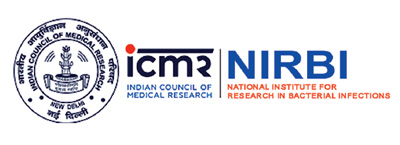ICMR - National Institute for Research
in Bacterial Infections
आईसीएमआर - राष्ट्रीय जीवाणु संक्रमण अनुसंधान संस्थान
Department of Health Research, Ministry of Health and Family Welfare, Government of India
स्वास्थ्य अनुसंधान विभाग, स्वास्थ्य और परिवार कल्याण मंत्रालय, भारत सरकार
WHO Collaborating Centre For Research and Training On Diarrhoeal Diseases
Immunology
Immunology

The Immunology Division of ICMR-NIRBI is
dedicated to enhancing our understanding of the immune
system’s role in combating both infectious and
non-communicable diseases. Through rigorous research,
collaboration, and education, we strive to make significant
contributions to public health and improve patient outcomes
worldwide.
Our team of scientists and researchers focus on uncovering
the intricate mechanisms that govern immune responses to
bacterial infections and to inflammatory stimuli, aiming to
develop innovative strategies for prevention, diagnosis, and
treatment. We employ a range of methodologies, including
flow cytometry, molecular biology, bioinformatics and
advanced imaging techniques, to conduct our research and
actively collaborate with other leading research
institutions/ hospitals to translate our findings into
practical applications.
Current focus areas include
:1.Understanding the long-term immune consequences of early life disruptions in the context of stunting with the intention of improving vaccine responses.
2.Studying the immune system’s role in sensing and responding to antibiotic-resistant bacteria, to potentiate immune responses against AMR. We are investigating how novel virulent bacteria employ innate immune evasion strategies to enable superior dissemination to distal organs.
3. Understanding the intestinal-derived host factors that contribute to development of obesity. We have studied the role of microbiome derived short chain fatty acids in this regard and have shown the lack of these bacterial-derived metabolites during obesity can lead to enhanced biogenesis of cholesterol. We have also reported how obesity-related immune alterations can enhance susceptibility to enteric bacterial infections.
4.In addition, we have developed a new field of understanding of mucosal immunity in Inflammatory Bowel Disease (IBD) in the light of RNA binding proteins. Our research showed the involvement of the balance of RNA binding proteins that dictates the immune outcome of the disease. We also employ a morpholino-derived novel antisense technology to target RNA binding protein as a therapeutic option for IBD.


